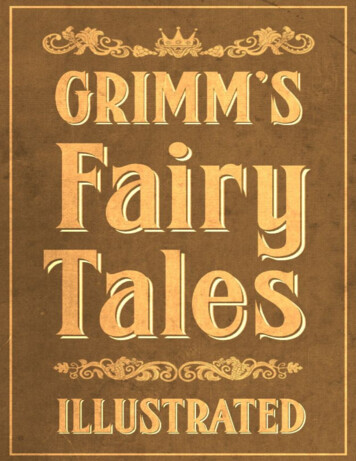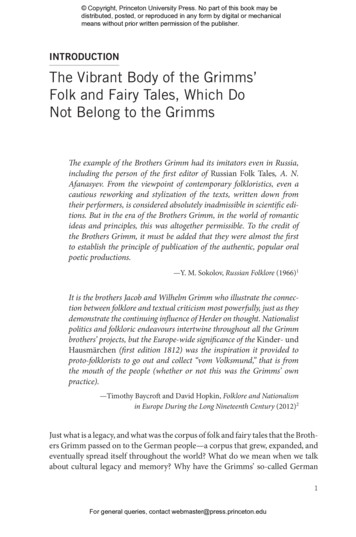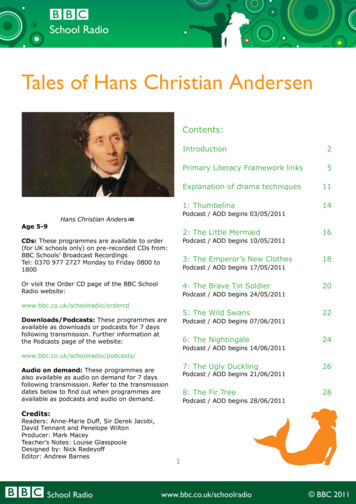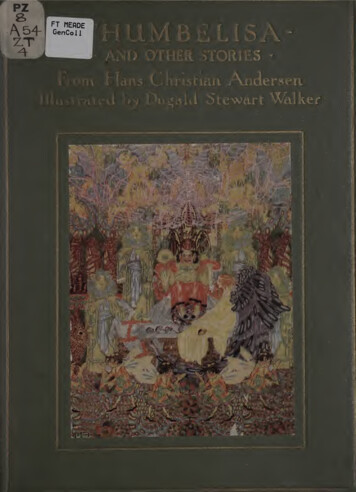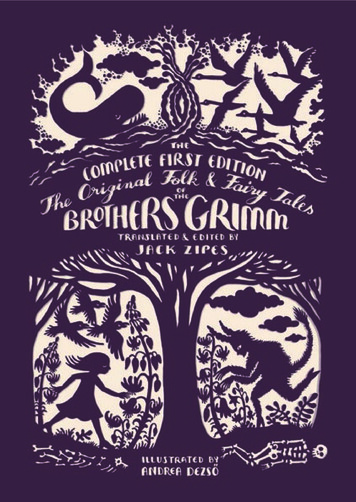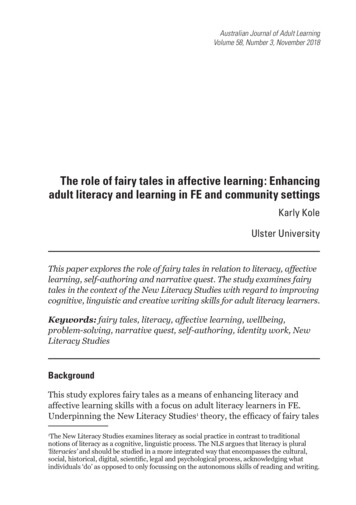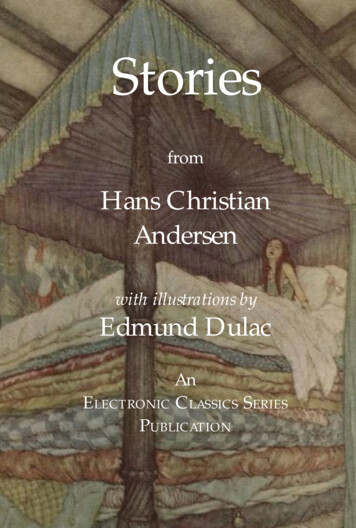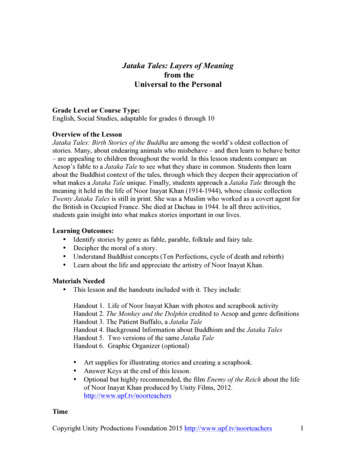
Transcription
Andersen’s Fairy TalesHans Christian AndersenThis eBook is designed and published by Planet PDF. For more freeeBooks visit our Web site at http://www.planetpdf.com/.
Andersen’s Fairy TalesTHE EMPEROR’S NEWCLOTHESMany years ago, there was an Emperor, who was soexcessively fond of new clothes, that he spent all hismoney in dress. He did not trouble himself in the leastabout his soldiers; nor did he care to go either to thetheatre or the chase, except for the opportunities thenafforded him for displaying his new clothes. He had adifferent suit for each hour of the day; and as of any otherking or emperor, one is accustomed to say, ‘he is sitting incouncil,’ it was always said of him, ‘The Emperor is sittingin his wardrobe.’Time passed merrily in the large town which was hiscapital; strangers arrived every day at the court. One day,two rogues, calling themselves weavers, made theirappearance. They gave out that they knew how to weavestuffs of the most beautiful colors and elaborate patterns,the clothes manufactured from which should have thewonderful property of remaining invisible to everyonewho was unfit for the office he held, or who wasextraordinarily simple in character.2 of 260
eBook brought to you byAndersen’s Fairy TalesCreate, view, and edit PDF. Download the free trial version.‘These must, indeed, be splendid clothes!’ thought theEmperor. ‘Had I such a suit, I might at once find out whatmen in my realms are unfit for their office, and also beable to distinguish the wise from the foolish! This stuffmust be woven for me immediately.’ And he caused largesums of money to be given to both the weavers in orderthat they might begin their work directly.So the two pretended weavers set up two looms, andaffected to work very busily, though in reality they didnothing at all. They asked for the most delicate silk andthe purest gold thread; put both into their own knapsacks;and then continued their pretended work at the emptylooms until late at night.‘I should like to know how the weavers are getting onwith my cloth,’ said the Emperor to himself, after somelittle time had elapsed; he was, however, ratherembarrassed, when he remembered that a simpleton, orone unfit for his office, would be unable to see themanufacture. To be sure, he thought he had nothing torisk in his own person; but yet, he would prefer sendingsomebody else, to bring him intelligence about theweavers, and their work, before he troubled himself in theaffair. All the people throughout the city had heard of thewonderful property the cloth was to possess; and all were3 of 260
Andersen’s Fairy Talesanxious to learn how wise, or how ignorant, theirneighbors might prove to be.‘I will send my faithful old minister to the weavers,’said the Emperor at last, after some deliberation, ‘he willbe best able to see how the cloth looks; for he is a man ofsense, and no one can be more suitable for his office thanbe is.’So the faithful old minister went into the hall, wherethe knaves were working with all their might, at theirempty looms. ‘What can be the meaning of this?’ thoughtthe old man, opening his eyes very wide. ‘I cannotdiscover the least bit of thread on the looms.’ However,he did not express his thoughts aloud.The impostors requested him very courteously to be sogood as to come nearer their looms; and then asked himwhether the design pleased him, and whether the colorswere not very beautiful; at the same time pointing to theempty frames. The poor old minister looked and looked,he could not discover anything on the looms, for a verygood reason, viz: there was nothing there. ‘What!’ thoughthe again. ‘Is it possible that I am a simpleton? I have neverthought so myself; and no one must know it now if I amso. Can it be, that I am unfit for my office? No, that must4 of 260
Andersen’s Fairy Talesnot be said either. I will never confess that I could not seethe stuff.’‘Well, Sir Minister!’ said one of the knaves, stillpretending to work. ‘You do not say whether the stuffpleases you.’‘Oh, it is excellent!’ replied the old minister, looking atthe loom through his spectacles. ‘This pattern, and thecolors, yes, I will tell the Emperor without delay, howvery beautiful I think them.’‘We shall be much obliged to you,’ said the impostors,and then they named the different colors and described thepattern of the pretended stuff. The old minister listenedattentively to their words, in order that he might repeatthem to the Emperor; and then the knaves asked for moresilk and gold, saying that it was necessary to completewhat they had begun. However, they put all that wasgiven them into their knapsacks; and continued to workwith as much apparent diligence as before at their emptylooms.The Emperor now sent another officer of his court tosee how the men were getting on, and to ascertainwhether the cloth would soon be ready. It was just thesame with this gentleman as with the minister; he surveyed5 of 260
Andersen’s Fairy Talesthe looms on all sides, but could see nothing at all but theempty frames.‘Does not the stuff appear as beautiful to you, as it didto my lord the minister?’ asked the impostors of theEmperor’s second ambassador; at the same time makingthe same gestures as before, and talking of the design andcolors which were not there.‘I certainly am not stupid!’ thought the messenger. ‘Itmust be, that I am not fit for my good, profitable office!That is very odd; however, no one shall know anythingabout it.’ And accordingly he praised the stuff he couldnot see, and declared that he was delighted with bothcolors and patterns. ‘Indeed, please your Imperial Majesty,’said he to his sovereign when he returned, ‘the clothwhich the weavers are preparing is extraordinarilymagnificent.’The whole city was talking of the splendid cloth whichthe Emperor had ordered to be woven at his ownexpense.And now the Emperor himself wished to see the costlymanufacture, while it was still in the loom. Accompaniedby a select number of officers of the court, among whomwere the two honest men who had already admired thecloth, he went to the crafty impostors, who, as soon as6 of 260
Andersen’s Fairy Talesthey were aware of the Emperor’s approach, went onworking more diligently than ever; although they still didnot pass a single thread through the looms.‘Is not the work absolutely magnificent?’ said the twoofficers of the crown, already mentioned. ‘If your Majestywill only be pleased to look at it! What a splendid design!What glorious colors!’ and at the same time they pointedto the empty frames; for they imagined that everyone elsecould see this exquisite piece of workmanship.‘How is this?’ said the Emperor to himself. ‘I can seenothing! This is indeed a terrible affair! Am I a simpleton,or am I unfit to be an Emperor? That would be the worstthing that could happen—Oh! the cloth is charming,’ saidhe, aloud. ‘It has my complete approbation.’ And hesmiled most graciously, and looked closely at the emptylooms; for on no account would he say that he could notsee what two of the officers of his court had praised somuch. All his retinue now strained their eyes, hoping todiscover something on the looms, but they could see nomore than the others; nevertheless, they all exclaimed,‘Oh, how beautiful!’ and advised his majesty to have somenew clothes made from this splendid material, for xcellent!’ resounded on all sides; and everyone was7 of 260
Andersen’s Fairy Talesuncommonly gay. The Emperor shared in the generalsatisfaction; and presented the impostors with the riband ofan order of knighthood, to be worn in their button-holes,and the title of ‘Gentlemen Weavers.’The rogues sat up the whole of the night before theday on which the procession was to take place, and hadsixteen lights burning, so that everyone might see howanxious they were to finish the Emperor’s new suit. Theypretended to roll the cloth off the looms; cut the air withtheir scissors; and sewed with needles without any threadin them. ‘See!’ cried they, at last. ‘The Emperor’s newclothes are ready!’And now the Emperor, with all the grandees of hiscourt, came to the weavers; and the rogues raised theirarms, as if in the act of holding something up, saying,‘Here are your Majesty’s trousers! Here is the scarf! Here isthe mantle! The whole suit is as light as a cobweb; onemight fancy one has nothing at all on, when dressed in it;that, however, is the great virtue of this delicate cloth.’‘Yes indeed!’ said all the courtiers, although not one ofthem could see anything of this exquisite manufacture.‘If your Imperial Majesty will be graciously pleased totake off your clothes, we will fit on the new suit, in frontof the looking glass.’8 of 260
Andersen’s Fairy TalesThe Emperor was accordingly undressed, and therogues pretended to array him in his new suit; theEmperor turning round, from side to side, before thelooking glass.‘How splendid his Majesty looks in his new clothes,and how well they fit!’ everyone cried out. ‘What adesign! What colors! These are indeed royal robes!’‘The canopy which is to be borne over your Majesty,in the procession, is waiting,’ announced the chief masterof the ceremonies.‘I am quite ready,’ answered the Emperor. ‘Do my newclothes fit well?’ asked he, turning himself round againbefore the looking glass, in order that he might appear tobe examining his handsome suit.The lords of the bedchamber, who were to carry hisMajesty’s train felt about on the ground, as if they werelifting up the ends of the mantle; and pretended to becarrying something; for they would by no means betrayanything like simplicity, or unfitness for their office.So now the Emperor walked under his high canopy inthe midst of the procession, through the streets of hiscapital; and all the people standing by, and those at thewindows, cried out, ‘Oh! How beautiful are ourEmperor’s new clothes! What a magnificent train there is9 of 260
Andersen’s Fairy Talesto the mantle; and how gracefully the scarf hangs!’ inshort, no one would allow that he could not see thesemuch-admired clothes; because, in doing so, he wouldhave declared himself either a simpleton or unfit for hisoffice. Certainly, none of the Emperor’s various suits, hadever made so great an impression, as these invisible ones.‘But the Emperor has nothing at all on!’ said a littlechild.‘Listen to the voice of innocence!’ exclaimed his father;and what the child had said was whispered from one toanother.‘But he has nothing at all on!’ at last cried out all thepeople. The Emperor was vexed, for he knew that thepeople were right; but he thought the procession must goon now! And the lords of the bedchamber took greaterpains than ever, to appear holding up a train, although, inreality, there was no train to hold.10 of 260
Andersen’s Fairy TalesTHE SWINEHERDThere was once a poor Prince, who had a kingdom.His kingdom was very small, but still quite large enoughto marry upon; and he wished to marry.It was certainly rather cool of him to say to theEmperor’s daughter, ‘Will you have me?’ But so he did;for his name was renowned far and wide; and there were ahundred princesses who would have answered, ‘Yes!’ and‘Thank you kindly.’ We shall see what this princess said.Listen!It happened that where the Prince’s father lay buried,there grew a rose tree—a most beautiful rose tree, whichblossomed only once in every five years, and even thenbore only one flower, but that was a rose! It smelt so sweetthat all cares and sorrows were forgotten by him whoinhaled its fragrance.And furthermore, the Prince had a nightingale, whocould sing in such a manner that it seemed as though allsweet melodies dwelt in her little throat. So the Princesswas to have the rose, and the nightingale; and they wereaccordingly put into large silver caskets, and sent to her.11 of 260
Andersen’s Fairy TalesThe Emperor had them brought into a large hall,where the Princess was playing at ‘Visiting,’ with the ladiesof the court; and when she saw the caskets with thepresents, she clapped her hands for joy.‘Ah, if it were but a little pussy-cat!’ said she; but therose tree, with its beautiful rose came to view.‘Oh, how prettily it is made!’ said all the court ladies.‘It is more than pretty,’ said the Emperor, ‘it ischarming!’But the Princess touched it, and was almost ready tocry.‘Fie, papa!’ said she. ‘It is not made at all, it is natural!’‘Let us see what is in the other casket, before we getinto a bad humor,’ said the Emperor. So the nightingalecame forth and sang so delightfully that at first no onecould say anything ill-humored of her.‘Superbe! Charmant! exclaimed the ladies; for they allused to chatter French, each one worse than her neighbor.‘How much the bird reminds me of the musical boxthat belonged to our blessed Empress,’ said an old knight.‘Oh yes! These are the same tones, the same execution.’‘Yes! yes!’ said the Emperor, and he wept like a child atthe remembrance.12 of 260
Andersen’s Fairy Tales‘I will still hope that it is not a real bird,’ said thePrincess.‘Yes, it is a real bird,’ said those who had brought it.‘Well then let the bird fly,’ said the Princess; and shepositively refused to see the Prince.However, he was not to be discouraged; he daubed hisface over brown and black; pulled his cap over his ears,and knocked at the door.‘Good day to my lord, the Emperor!’ said he. ‘Can Ihave employment at the palace?’‘Why, yes,’ said the Emperor. ‘I want some one to takecare of the pigs, for we have a great many of them.’So the Prince was appointed ‘Imperial Swineherd.’ Hehad a dirty little room close by the pigsty; and there he satthe whole day, and worked. By the evening he had madea pretty little kitchen-pot. Little bells were hung all roundit; and when the pot was boiling, these bells tinkled in themost charming manner, and played the old melody,‘Ach! du lieber Augustin, Alles ist weg, weg, weg!’** ‘Ah! dear Augustine! All is gone, gone, gone!’But what was still more curious, whoever held hisfinger in the smoke of the kitchen-pot, immediately smeltall the dishes that were cooking on every hearth in the13 of 260
Andersen’s Fairy Talescity—this, you see, was something quite different from therose.Now the Princess happened to walk that way; andwhen she heard the tune, she stood quite still, and seemedpleased; for she could play ‘Lieber Augustine"; it was theonly piece she knew; and she played it with one finger.‘Why there is my piece,’ said the Princess. ‘Thatswineherd must certainly have been well educated! Go inand ask him the price of the instrument.’So one of the court-ladies must run in; however, shedrew on wooden slippers first.‘What will you take for the kitchen-pot?’ said the lady.‘I will have ten kisses from the Princess,’ said theswineherd.‘Yes, indeed!’ said the lady.‘I cannot sell it for less,’ rejoined the swineherd.‘He is an impudent fellow!’ said the Princess, and shewalked on; but when she had gone a little way, the bellstinkled so prettily‘Ach! du lieber Augustin, Alles ist weg, weg, weg!’‘Stay,’ said the Princess. ‘Ask him if he will have tenkisses from the ladies of my court.’‘No, thank you!’ said the swineherd. ‘Ten kisses fromthe Princess, or I keep the kitchen-pot myself.’14 of 260
eBook brought to you byAndersen’s Fairy TalesCreate, view, and edit PDF. Download the free trial version.‘That must not be, either!’ said the Princess. ‘But doyou all stand before me that no one may see us.’And the court-ladies placed themselves in front of her,and spread out their dresses—the swineherd got ten kisses,and the Princess—the kitchen-pot.That was delightful! The pot was boiling the wholeevening, and the whole of the following day. They knewperfectly well what was cooking at every fire throughoutthe city, from the chamberlain’s to the cobbler’s; thecourt-ladies danced and clapped their hands.‘We know who has soup, and who has pancakes fordinner to-day, who has cutlets, and who has eggs. Howinteresting!’‘Yes, but keep my secret, for I am an Emperor’sdaughter.’The swineherd—that is to say—the Prince, for no oneknew that he was other than an ill-favored swineherd, letnot a day pass without working at something; he at lastconstructed a rattle, which, when it was swung round,played all the waltzes and jig tunes, which have ever beenheard since the creation of the world.‘Ah, that is superbe!’ said the Princess when she passedby. ‘I have never heard prettier compositions! Go in and15 of 260
Andersen’s Fairy Talesask him the price of the instrument; but mind, he shallhave no more kisses!’‘He will have a hundred kisses from the Princess!’ saidthe lady who had been to ask.‘I think he is not in his right senses!’ said the Princess,and walked on, but when she had gone a little way, shestopped again. ‘One must encourage art,’ said she, ‘I amthe Emperor’s daughter. Tell him he shall, as on yesterday,have ten kisses from me, and may take the rest from theladies of the court.’‘Oh—but we should not like that at all!’ said they.‘What are you muttering?’ asked the Princess. ‘If I can kisshim, surely you can. Remember that you owe everythingto me.’ So the ladies were obliged to go to him again.‘A hundred kisses from the Princess,’ said he, ‘or else leteveryone keep his own!’‘Stand round!’ said she; and all the ladies stood roundher whilst the kissing was going on.‘What can be the reason for such a crowd close by thepigsty?’ said the Emperor, who happened just then to stepout on the balcony; he rubbed his eyes, and put on hisspectacles. ‘They are the ladies of the court; I must godown and see what they are about!’ So he pulled up hisslippers at the heel, for he had trodden them down.16 of 260
Andersen’s Fairy TalesAs soon as he had got into the court-yard, he movedvery softly, and the ladies were so much engrossed withcounting the kisses, that all might go on fairly, that theydid not perceive the Emperor. He rose on his tiptoes.‘What is all this?’ said he, when he saw what was goingon, and he boxed the Princess’s ears with his slipper, justas the swineherd was taking the eighty-sixth kiss.‘March out!’ said the Emperor, for he was very angry;and both Princess and swineherd were thrust out of thecity.The Princess now stood and wept, the swineherdscolded, and the rain poured down.‘Alas! Unhappy creature that I am!’ said the Princess. ‘IfI had but married the handsome young Prince! Ah! howunfortunate I am!’And the swineherd went behind a tree, washed theblack and brown color from his face, threw off his dirtyclothes, and stepped forth in his princely robes; he lookedso noble that the Princess could not help bowing beforehim.‘I am come to despise thee,’ said he. ‘Thou would’stnot have an honorable Prince! Thou could’st not prize therose and the nightingale, but thou wast ready to kiss the17 of 260
Andersen’s Fairy Talesswineherd for the sake of a trumpery plaything. Thou artrightly served.’He then went back to his own little kingdom, and shutthe door of his palace in her face. Now she might wellsing,‘Ach! du lieber Augustin, Alles ist weg, weg, weg!’18 of 260
Andersen’s Fairy TalesTHE REAL PRINCESSThere was once a Prince who wished to marry aPrincess; but then she must be a real Princess. He travelledall over the world in hopes of finding such a lady; butthere was always something wrong. Princesses he found inplenty; but whether they were real Princesses it wasimpossible for him to decide, for now one thing, nowanother, seemed to him not quite right about the ladies.At last he returned to his palace quite cast down, becausehe wished so much to have a real Princess for his wife.One evening a fearful tempest arose, it thundered andlightened, and the rain poured down from the sky intorrents: besides, it was as dark as pitch. All at once therewas heard a violent knocking at the door, and the oldKing, the Prince’s father, went out himself to open it.It was a Princess who was standing outside the door.What with the rain and the wind, she was in a sadcondition; the water trickled down from her hair, and herclothes clung to her body. She said she was a real Princess.‘Ah! we shall soon see that!’ thought the old Queenmother; however, she said not a word of what she wasgoing to do; but went quietly into the bedroom, took all19 of 260
Andersen’s Fairy Talesthe bed-clothes off the bed, and put three little peas on thebedstead. She then laid twenty mattresses one uponanother over the three peas, and put twenty feather bedsover the mattresses.Upon this bed the Princess was to pass the night.The next morning she was asked how she had slept.‘Oh, very badly indeed!’ she replied. ‘I have scarcelyclosed my eyes the whole night through. I do not knowwhat was in my bed, but I had something hard under me,and am all over black and blue. It has hurt me so much!’Now it was plain that the lady must be a real Princess,since she had been able to feel the three little peas throughthe twenty mattresses and twenty feather beds. None but areal Princess could have had such a delicate sense offeeling.The Prince accordingly made her his wife; being nowconvinced that he had found a real Princess. The threepeas were however put into the cabinet of curiosities,where they are still to be seen, provided they are not lost.Wasn’t this a lady of real delicacy?20 of 260
Andersen’s Fairy TalesTHE SHOES OF FORTUNE21 of 260
Andersen’s Fairy TalesI. A BeginningEvery author has some peculiarity in his descriptions orin his style of writing. Those who do not like him,magnify it, shrug up their shoulders, and exclaim—therehe is again! I, for my part, know very well how I can bringabout this movement and this exclamation. It wouldhappen immediately if I were to begin here, as I intendedto do, with: ‘Rome has its Corso, Naples its Toledo’—‘Ah! that Andersen; there he is again!’ they would cry; yetI must, to please my fancy, continue quite quietly, andadd: ‘But Copenhagen has its East Street.’Here, then, we will stay for the present. In one of thehouses not far from the new market a party was invited—avery large party, in order, as is often the case, to get areturn invitation from the others. One half of thecompany was already seated at the card-table, the otherhalf awaited the result of the stereotype preliminaryobservation of the lady of the house:‘Now let us see what we can do to amuse ourselves.’They had got just so far, and the conversation began tocrystallise, as it could but do with the scanty stream whichthe commonplace world supplied. Amongst other thingsthey spoke of the middle ages: some praised that period as22 of 260
Andersen’s Fairy Talesfar more interesting, far more poetical than our own toosober present; indeed Councillor Knap defended thisopinion so warmly, that the hostess declared immediatelyon his side, and both exerted themselves with unweariedeloquence. The Councillor boldly declared the time ofKing Hans to be the noblest and the most happy period.** A.D. 1482-1513While the conversation turned on this subject, and wasonly for a moment interrupted by the arrival of a journalthat contained nothing worth reading, we will just stepout into the antechamber, where cloaks, mackintoshes,sticks, umbrellas, and shoes, were deposited. Here sat twofemale figures, a young and an old one. One might havethought at first they were servants come to accompanytheir mistresses home; but on looking nearer, one soonsaw they could scarcely be mere servants; their forms weretoo noble for that, their skin too fine, the cut of their dresstoo striking. Two fairies were they; the younger, it is true,was not Dame Fortune herself, but one of the waitingmaids of her handmaidens who carry about the lesser goodthings that she distributes; the other looked extremelygloomy—it was Care. She always attends to her ownserious business herself, as then she is sure of having itdone properly.23 of 260
Andersen’s Fairy TalesThey were telling each other, with a confidentialinterchange of ideas, where they had been during the day.The messenger of Fortune had only executed a fewunimportant commissions, such as saving a new bonnetfrom a shower of rain, etc.; but what she had yet toperform was something quite unusual.‘I must tell you,’ said she, ‘that to-day is my birthday;and in honor of it, a pair of walking-shoes or galoshes hasbeen entrusted to me, which I am to carry to mankind.These shoes possess the property of instantly transportinghim who has them on to the place or the period in whichhe most wishes to be; every wish, as regards time or place,or state of being, will be immediately fulfilled, and so atlast man will be happy, here below.’‘Do you seriously believe it?’ replied Care, in a severetone of reproach. ‘No; he will be very unhappy, and willassuredly bless the moment when he feels that he has freedhimself from the fatal shoes.’‘Stupid nonsense!’ said the other angrily. ‘I will putthem here by the door. Some one will make a mistake forcertain and take the wrong ones—he will be a happyman.’Such was their conversation.24 of 260
Andersen’s Fairy TalesII. What Happened to the CouncillorIt was late; Councillor Knap, deeply occupied with thetimes of King Hans, intended to go home, and maliciousFate managed matters so that his feet, instead of findingtheir way to his own galoshes, slipped into those ofFortune. Thus caparisoned the good man walked out ofthe well-lighted rooms into East Street. By the magicpower of the shoes he was carried back to the times ofKing Hans; on which account his foot very naturally sankin the mud and puddles of the street, there having been inthose days no pavement in Copenhagen.‘Well! This is too bad! How dirty it is here!’ sighed theCouncillor. ‘As to a pavement, I can find no traces of one,and all the lamps, it seems, have gone to sleep.’The moon was not yet very high; it was besides ratherfoggy, so that in the darkness all objects seemed mingledin chaotic confusion. At the next corner hung a votivelamp before a Madonna, but the light it gave was littlebetter than none at all; indeed, he did not observe itbefore he was exactly under it, and his eyes fell upon thebright colors of the pictures which represented the wellknown group of the Virgin and the infant Jesus.25 of 260
Andersen’s Fairy Tales‘That is probably a wax-work show,’ thought he; ‘andthe people delay taking down their sign in hopes of a latevisitor or two.’A few persons in the costume of the time of King Hanspassed quickly by him.‘How strange they look! The good folks come probablyfrom a masquerade!’Suddenly was heard the sound of drums and fifes; thebright blaze of a fire shot up from time to time, and itsruddy gleams seemed to contend with the bluish light ofthe torches. The Councillor stood still, and watched amost strange procession pass by. First came a dozendrummers, who understood pretty well how to handletheir instruments; then came halberdiers, and some armedwith cross-bows. The principal person in the processionwas a priest. Astonished at what he saw, the Councillorasked what was the meaning of all this mummery, andwho that man was.‘That’s the Bishop of Zealand,’ was the answer.‘Good Heavens! What has taken possession of theBishop?’ sighed the Councillor, shaking his bead. Itcertainly could not be the Bishop; even though he wasconsidered the most absent man in the whole kingdom,and people told the drollest anecdotes about him.26 of 260
eBook brought to you byAndersen’s Fairy TalesCreate, view, and edit PDF. Download the free trial version.Reflecting on the matter, and without looking right orleft, the Councillor went through East Street and acrossthe Habro-Platz. The bridge leading to Palace Square wasnot to be found; scarcely trusting his senses, the nocturnalwanderer discovered a shallow piece of water, and herefell in with two men who very comfortably were rockingto and fro in a boat.‘Does your honor want to cross the ferry to theHolme?’ asked they.‘Across to the Holme!’ said the Councillor, who knewnothing of the age in which he at that moment was. ‘No,I am going to Christianshafen, to Little Market Street.’Both men stared at him in astonishment.‘Only just tell me where the bridge is,’ said he. ‘It isreally unpardonable that there are no lamps here; and it isas dirty as if one had to wade through a morass.’The longer he spoke with the boatmen, the moreunintelligible did their language become to him.‘I don’t understand your Bornholmish dialect,’ said heat last, angrily, and turning his back upon them. He wasunable to find the bridge: there was no railway either. ‘It isreally disgraceful what a state this place is in,’ muttered heto himself. Never had his age, with which, however, hewas always grumbling, seemed so miserable as on this27 of 260
Andersen’s Fairy Talesevening. ‘I’ll take a hackney-coach!’ thought he. Butwhere were the hackneycoaches? Not one was to be seen.‘I must go back to the New Market; there, it is to behoped, I shall find some coaches; for if I don’t, I shallnever get safe to Christianshafen.’So off he went in the direction of East Street, and hadnearly got to the end of it when the moon shone forth.‘God bless me! What wooden scaffolding is that whichthey have set up there?’ cried he involuntarily, as helooked at East Gate, which, in those days, was at the endof East Street.He found, however, a little side-door open, andthrough this he went, and stepped into our New Marketof the present time. It was a huge desolate plain; somewild bushes stood up here and there, while across the fieldflowed a broad canal or river. Some wretched hovels forthe Dutch sailors, resembling great boxes, and after whichthe place was named, lay about in confused disorder onthe opposite bank.‘I either behold a fata morgana, or I am regularly tipsy,’whimpered out the Councillor. ‘But what’s this?’He turned round anew, firmly convinced that he wasseriously ill. He gazed at the street formerly so well knownto him, and now so strange in appearance, and looked at28 of 260
Andersen’s Fairy Tales Hans Christian Andersen This eBook is designed and published by Planet PDF. For more free . Andersen’s Fairy Tales 2 of 260 THE EMPEROR’S NEW CLOTHES Many years ago, there was an Emperor, who was so excessively fond of new clothes, that he spent all hisFile Size: 625KBPage Count: 260
